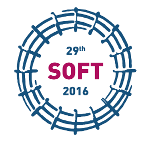Speaker
Francesco Fellin
(Consorzio RFX)
Description
The ITER project requires at least two Neutral Beam Injectors (NBIs), each accelerating to 1MV a 40A beam of negative deuterium ions, to deliver to the plasma a power of about 33 MW for one hour as additional heating.Since these requirements have never been experimentally met, it was recognized necessary to build-up a test facility, named PRIMA (Padova Research on ITER Megavolt Accelerator), in Italy, including both a 100 kV full-size negative ion source (SPIDER - Source for Production of Ion of Deuterium Extracted from Rf plasma) and a prototype of the whole 1 MV ITER injector (MITICA - Megavolt ITER Injector & Concept Advancement).The mission of SPIDER is to increase the understanding of the source operation and to optimize the source performance in terms of extracted current density, current uniformity and duration.The SPIDER experiment needs a dedicated Cooling Plant to remove up to 10 MW heat loads applied during the one hour pulses to the beam source, the beam dump/calorimeter and the power supplies. The total water flow rate necessary to remove the heat and guarantee the optimal control of temperatures is about 150 kg/s at full operational conditions.The plant is widespread over the whole PRIMA site area and is characterized by several physical interfaces with the SPIDER experiment, the related power supplies and control system and finally with PRIMA buildings and civil plants. A well-equipped system of sensors and feed-back control system is also present to guarantee the correct performances of the plant during different operational phases.The paper deals with the installation and testing phases of the plant under execution, with particular emphasis on integration problems, electrical insulation, tests of immunity to electromagnetic interference, vibration issues, monitoring and safety issues for possible activated water and finally the acceptance tests before integrated commissioning.
Co-authors
Adriano Luchetta
(Consorzio RFX, Padova, Italy)
Andrea Turetta
(Progetto Decibel, Padova, Italy)
Francesco Fellin
(Consorzio RFX, Padova, Italy)
Gabriele Cenedella
(Delta-Ti Impianti S.p.A, Rivoli (TO), Italy)
Gabriele Lazzaro
(Consorzio RFX, Padova, Italy)
Gilbert Agarici
(Fusion for Energy F4E, Barcelona, Spain)
Marco Bigi
(Consorzio RFX, Padova, Italy)
Matteo Zaupa
(Consorzio RFX, Padova, Italy)
Mauro Breda
(Consorzio RFX, Padova, Italy)
Michele Tamagnone
(Delta-Ti Impianti S.p.A, Rivoli (TO), Italy)
Moreno Maniero
(Consorzio RFX, Padova, Italy)
Nicola Granzotto
(Progetto Decibel, Padova, Italy)
Nicola Pilan
(Consorzio RFX, Padova, Italy)
Pierluigi Zaccaria
(Consorzio RFX, Padova, Italy)
Vincent Pilard
(Fusion for Energy F4E, Barcelona, Spain)

